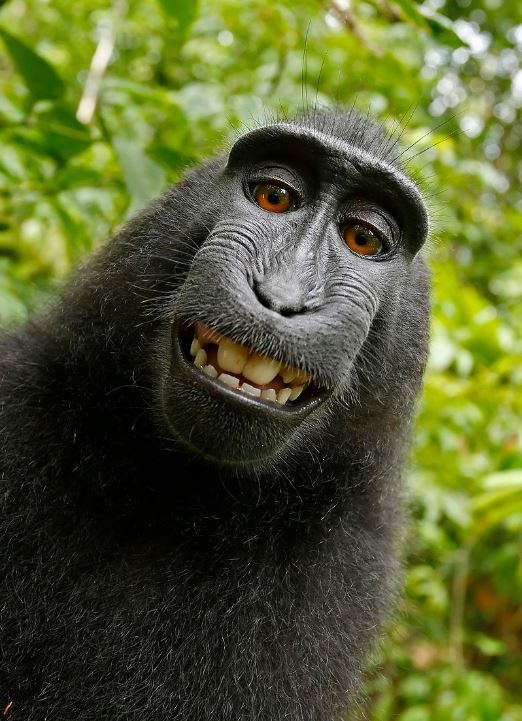Can A Monkey Copyright His Original Works?
- by Michael Stillman

From the big smile you would think Naruto already won the case (photo from Wikipedia).
The U. S. Court of Appeals in San Francisco recently heard an interesting case, one which generated more laughs than scholarly legal commentary. It involved a monkey that took a "selfie" picture. The monkey seems to be getting a few laughs out of the picture too, though he probably hasn't delved into the legal ramifications, even if it is his rights that are at stake.
Almost a decade ago, a British photographer set up a camera on an Indonesian reserve where a rare breed of monkey (Celebes Crested Macaque) lives. They had shown previous curiosity with cameras. One of them stood in front of the camera and pressed the shutter a few times. He certainly seemed amused, as his "selfie" reveals, but then moved on, likely forgetting the incident soon thereafter.
The British photographer, David Slater, sought a copyright for the photographs, but was denied by the Copyright Office. Their decision was that photographs created by non-humans may not be copyrighted. A photograph then appeared in Wikipedia and quickly went viral. Slater was out of luck.
However, an organization went to court to overrule the Copyright Office's decision. If it prevails, Slater will still be out of luck. The organization is People for the Ethical Treatment of Animals. PETA claims the photograph can be copyrighted, only the legitimate copyright holder is Naruto, the name humans gave the monkey, rather than Slater. PETA has kindly agreed to manage the copyright on Naruto's behalf if given the copyright. They would use the proceeds of that copyright to help the endangered macaques.
To no great surprise, the lower court denied PETA's claim. And so, PETA has appealed. It argues that nothing in the copyright statute says animals may not hold one. However, the lower court dismissed PETA's claim saying that if the statute was meant to take the extraordinary step of protecting the right of animals to hold copyrights, it would say so. The higher court may now rule on whether animals may or may not hold copyrights, or it could take the easy way out, such as saying PETA does not have the right to represent Naruto.
So, what does all of this have to do with books? Remember the Infinite Monkey Theorem? That is the proposition that says if you put monkeys in front of typewriters for an infinite amount of time, eventually one will rewrite a work of Shakespeare. We know this theorem has been around a long time because it uses typewriters, not PCs.
The amazing thing is that probability theory tells us this is correct. Random banging on keys of a typewriter for an infinite amount of time will eventually lead one of the monkeys to type out Hamlet, since, as long a shot as the odds are, the odds are still shorter than infinite. It's just a matter of time. One presumes that the monkey who rewrites Hamlet will not be able to get a copyright. However, more likely than typing out Hamlet is that a monkey will create a new work of literature. What then? Will this book be copyrightable? If so, who will own the copyright? Probability theory says that the day is coming, even if it is unlikely we will be here to witness it. The law needs to be prepared for that day!